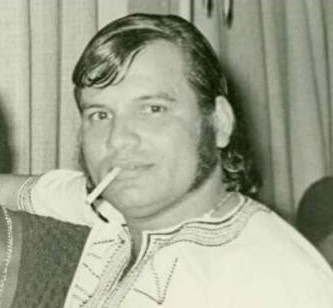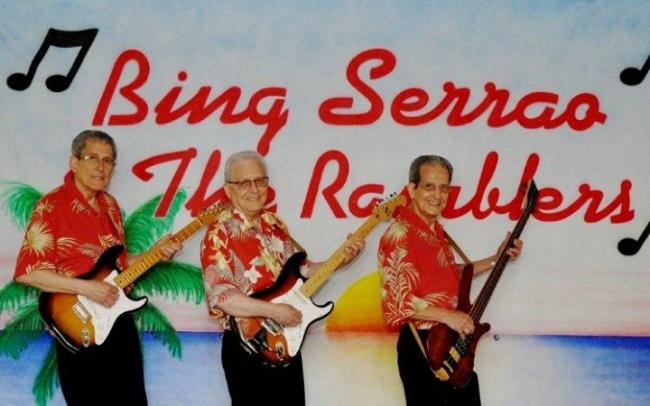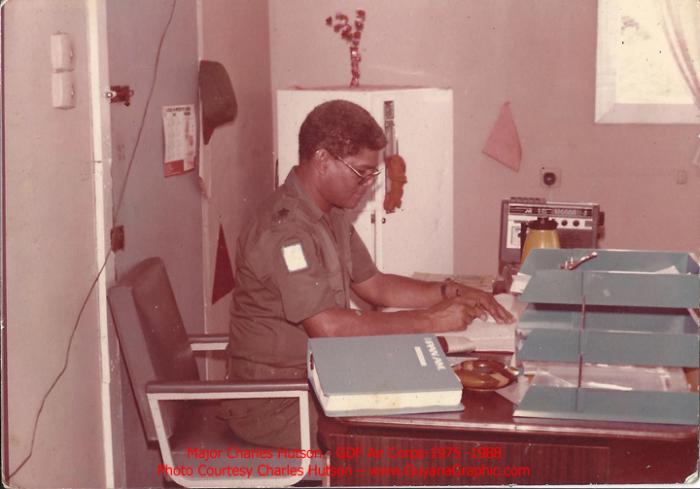Pancho Carew was born Terrence Anthony on October 18, 1940, and died on Sept. 22, 1999
He was the host of popular radio shows Best by Request and Pop Along, also a DJ at the fashionable dance/party/night clubs in the early 1970s, “Dog And The Bone” and “Talk of The Town”
An Excerpt from Guyana Chronicle October 24, 1999 by G.I. Chappelle
Pancho Carew, radio personality who died last month, would have celebrated his 59th birthday on Monday last. Today, we remember Pancho.
“Pancho is an unforgettable character. I think Pancho was the live-wire of broadcasting. And years from now, when radio is written about or whenever anybody talks about radio, Pancho’s name will come up.
“He was the greatest in broadcasting, not only in Guyana, but throughout the Caribbean.”
So said fellow radio personality, Bertie Chancellor of his colleague Pancho Carew.
Pancho, as he was familiarly called, died of a heart attack at the Georgetown Hospital on Wednesday, September 22, plunging the nation into mourning.
Described by his mother, Adelaide as a “man of the people”, Pancho had been involved in broadcasting for some 30 years. Guyanese will remember him as a disc jockey par excellence, with a love and taste for music that few will better.
“He was someone who brought light and joy to many homes and many people. He had this love for music that was different. And he had a great sense of humour. Pancho gave his life to radio. Even at times when he didn’t feel well, he would still come to work,” said Programme Director at the Guyana Broadcasting Corporation (GBC), Phyllis Jackson, who was Pancho’s immediate supervisor.
The last time he made live contact with the nation was Saturday, September 18, 1999. The security log recorded that Pancho reached Broadcasting House at 9:30 hours. He went to the studio, made his usual telephone calls then went to the lobby to chat with colleagues.
Pancho then enraptured the nation from 13:15 hours and left Broadcasting House at 15:48 hours.
That was the last time he would be in the studio.
Linden Lewis was his operator that day. “Saturday, when we started the show, he gave me a Maxi Priest cassette and said this is a brand new cassette and (he asked me) if I loved this song with Maxi Priest and Beenie Man. He then appealed to the mini-bus drivers to take it easy on the road ways, especially (since six persons) had died on Soesdyke/Linden highway. He appealed to the public to be more careful.”
On Monday, September 20, Pancho called acting Programme Manager Phyllis Jackson: “PJ, get somebody to work for me. I’m not feeling well.”
He told her he was getting a fever. That night, he suffered a heart attack.
Pancho was rushed to the Georgetown Hospital and was in the Intensive Care Unit when Jackson and Ulita Anthony visited him.
Jackson asked him: “PC, what’s wrong.”
Still probably thinking about his work, Pancho responded: “PJ, I’m sorry.”
Jackson held him on his shoulder. It was already cold. She could sense the end was nigh. He died about 20:00 hours Wednesday night.
Terrence Anthony Carew was the first of eight children born to Leon and Adelaide Carew. He grew up with his grandmother who died when he was 14 years old. He then went to live with his parents and other siblings.
How did Pancho get his name? He had pancho-type shirts in his teens which he wore often enough for his friends to call him `Pancho’ – a nickname which stuck when he was with Combo 7, a musical band.
And that was the name by which Guyana and the Caribbean came to know him. In fact, very few people knew his first name was Terrence.
“Music was always his passion. He learned to play the piano because he grew up with his grandmother,” Pancho’s brother recalled.
Pancho’s love for music lasted a lifetime, and blessed with a great voice, he became a household name for nearly 30 years in radio.
Pancho started his DJ career with Butch Parmanand who recalled: “We started from zero finance. Then we promoted all the shows in this country you can think about – starting with the little shows in Buxton and other places, like Linden. We then went with Byron Lee at the National Park.”
Broadcasting stalwart Clem David said: “Here’s a DJ, if I ever wanted to become one I would have wanted to sound something like him. But there was a lot more to Pancho other than just being a great DJ, a great entertainer, a great Master of Ceremonies. He had a humane side. He always cared about people, always cared about enjoying their company and talking with them. He was very humble,too.”
Pancho even donned a Santa Clause costume for a Needy Children’s show at the National Park. He arrived by helicopter.
Pancho once worked with the First Federation Life Insurance Company. Yes. Pancho was an insurance man. At that time, he was also the MC with Des Glasford Combo 7.
Along with Vic Insanally, Leo Jahoor and Parmanand, Pancho went to Suriname with Lata Mangeshkar. Parmanand recalled: “Pancho dressed in his dhoti and was signing autographs.”
How did Pancho get into radio? Terry Holder remembered: “He was always very articulate and he wanted to get into broadcasting.”
He had that ability to grasp, to ad lib and Holder recommended him for radio and encouraged him.
“And he really made it. He was a good broadcaster. He had a good voice. And he knew how to communicate with people. That was Pancho’s gift, being able to talk with a lot of persons outside who understood what he was saying,” Holder said.
Pancho started his career under Ron Sanders in the then Guyana Broadcasting Service.
Sanders recalled: “He was at the time the MC of the Des Glasford’s Combo 7. He was the most phenomenal entertainer one could want to see on stage. And I believed then that he could bring to radio the quality that he brought to a stage, to a microphone, and that he would be able to entertain hundreds of thousands more people in that way than he did on stage.”
And it proved to be absolutely true. Said Sanders: “He had remarkable energy, remarkable dynamism. And here was a young man … with a great talent for entertaining people and a great love of music. And he transposed that love of music and that capacity for entertainment for the enjoyment of many, many, many Guyanese over a very long period of time.”
Another long-serving broadcaster and household name, Ron Robinson, credits himself as being the one to actually put Pancho on air. He was an announcer/operator then.
“I was on air one Saturday afternoon and I remember Pancho came down and he said `You know I would really like to do this.’ I said, `Okay, go into the studio and you see that little red knob, press it down and do your thing. And he introduced a couple of tunes and what not, and gave the time. It sounded good. In fact, when he first did it, he pulled up the knob instead of pressing it down. I said `Pancho, down’ and that was how Pancho started,” Robinson recounted.
Joan Green of GBS remembered Pancho in the early days: “Pancho would saunter into GBS in the seventies at about mid-day in time for his one o’clock shift as a disc jockey. And I don’t remember ever seeing him in a bad mood on those occasions. I can’t remember ever hearing him behave like a prima donna which was something not unheard of among broadcasters. He always jauntily entered the studio and Pancho would literally exude warmth and cheer for the next two, three hours, throughout his shift.”
Vic Insanally, another distinguished broadcaster said: “He devoted his entire life to music, radio and the daily task of boosting the morale of this nation, of instilling a sense of pride in Guyanese, and in trying to always bring us together. He never missed an opportunity for mixing with the people and for telling us what a great place Guyana was.”
Pancho had many opportunities to live in Canada, but he did not abandon Guyana. He first went there with his parents some 25 years ago. He returned home. His mother still lives there, so do all his siblings, except for one brother who now lives in Barbados.
“This country was as much a part of him as he was a part of it,” his mother said. She added: “How does a man turn his back on a part of himself?”
Pancho was so patriotic that he requested that his ashes be scattered in the three main rivers of the country, a wish that was honoured by his family.
Renowned Guyanese musician Dave Martin said: “Pancho was an original boy. He had this unique style and this unique flavour about him. Guyanese connected with him in a great way. We tend in the Caribbean not to have a lot of confidence… Pancho was the opposite. Pancho showed us you could be yourself and strut and come off with it. We should remember him as an example to take pride in who you are, take pride in what you do.”
Jamaica’s Byron Lee said: “I don’t think Guyana would be the same without Pancho. You have lost a great, great person, a personality. What Pancho was to me, was more than just somebody who played our records and spoke on the air.”
To Byron Lee, he was a true friend who would sit and reminisce about the early days when we used to come to Guyana and you had bands like the Tradewinds, BG Ramblers there that a lot of the young people today don’t know about.
“And Pancho’s idea was to keep that music alive so that the young people would know where the music came from. A lot of the young people in the Caribbean don’t know the history of their music,” Byron Lee said.
Operator Lewis remembers Pancho liking a lot of soca, and a lot of up-tempo music. Said Lewis: “Pancho did not like a lot of soul, but every Friday we would play oldies. But during the week, he is this bouncy type of person. `Kitty kat’ – he would play it five or six times – over and over, over and over again…
And he transferred that love of Caribbean music to his work-mates. GBC’s only female operator, Lynette Baird said: “He introduced me to a lot of music. I never liked soca, but Pancho gave me some Byron Lee and I started liking soca.”
Carlton James, another distinguished broadcaster said: “I think Pancho Carew was the first among equals. In the early seventies, those of us throughout the Caribbean who knew about broadcasting, tended to compare Pancho Carew with Don Toppin of Jamaica, but somehow, for us, Pancho always came out ahead because of his personable nature and the fact that he took radio far beyond the boundaries of a small studio in the city.”






